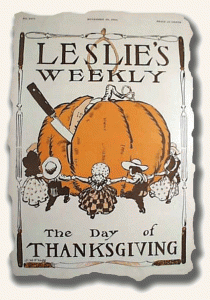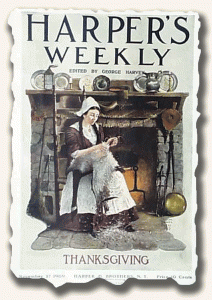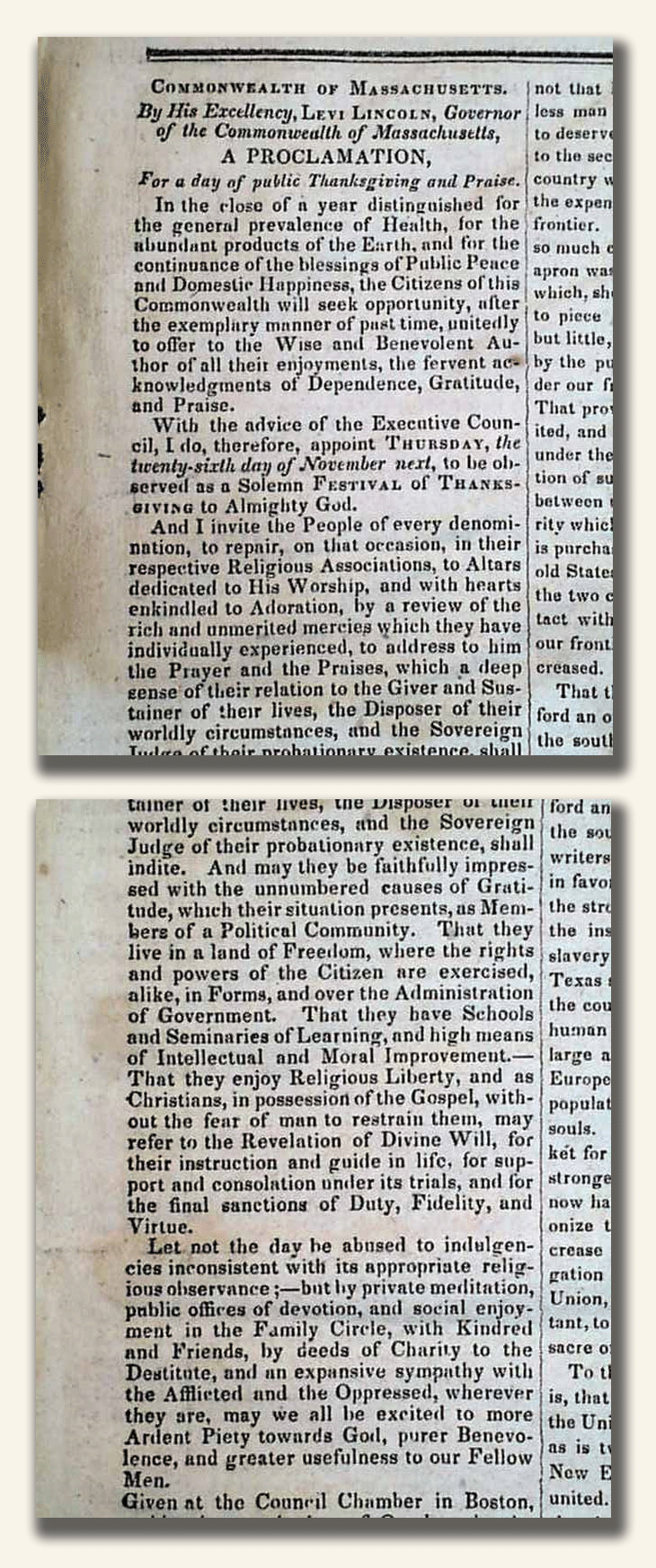A modest resume…
November 23, 2009 by TimHughes · Leave a Comment
“The Crisis” newspaper from Columbus, Ohio, dated May 24, 1863 ran the piece on Lincoln shown in the photo. Keep in mind that this was a “copperhead” newspaper (northern paper opposed to the war, even advocating the continuance of slavery) so there was much criticism to Lincoln and his administration throughout it’s print run, so it is likely the piece was printed to emphasize the “modestness” of his resume.
From what we know of Abraham Lincoln this short piece he submitted, despite likely edits by the newspaper publisher, is largely correct and emphasizes the humble background of the man whom history arguably ranks as among the best of American Presidents. Certainly the trappings of wealth, family pedigree and the best of education which are traits common to leaders in other parts of the world are not prerequisites to success in America. This simple piece in a 146 year old newspaper is evidence that “the American dream” has been alive and well on this side of the Atlantic for many years.

Lincoln’s assassination in a Washington, D.C., newspaper…
October 26, 2009 by TimHughes · 7 Comments
 One of the (positive) frustrations we have always dealt with as a rare newspaper dealer is not being able to share some of the best material which comes our way. Not surprisingly very rare and very historic items have a waiting list of customers waiting for it to come into inventory and such newspapers are typically sold before they have the opportunity to be listed in a catalog. But here is where our blog is of value, allowing us an opportunity to share some nice material even though no longer available for purchase.
One of the (positive) frustrations we have always dealt with as a rare newspaper dealer is not being able to share some of the best material which comes our way. Not surprisingly very rare and very historic items have a waiting list of customers waiting for it to come into inventory and such newspapers are typically sold before they have the opportunity to be listed in a catalog. But here is where our blog is of value, allowing us an opportunity to share some nice material even though no longer available for purchase.
Holding true to the belief that newspapers from cities where historic events took place are the best to have, our recent sale of the “Daily Morning Chronicle” of April 15, 1865 from Washington, D.C. fits this description very well. Although purchased by a member with a *“want list” for such material, the issue is too fascinating not to share with others, hence this link to the listing and photos.
Enjoy one of the best newspapers to have on Lincoln’s assassination.
* Note: Although we manage a want list for key material, with thousands of such wants, the system is not perfect (i.e., we occasionally miss an item on someone’s want list and it ends up being purchased through a member or public offering). We simply promise to do the best we can. If you have key content of interest, feel free to be in touch.
Terrific “association” item in American history…
October 22, 2009 by TimHughes · 2 Comments
One of the joys in collecting early newspapers is discovering the little gem found buried in an issue which was innocuous at the time but which has since transcended to much greater importance in American history. The small advertisement shown, which appears on page 3 of the April 13 issue of the “Daily Morning Chronicle” of Washington, D.C., is one.
 Certainly Abraham Lincoln, and any other Washington, D.C. resident who read this ad, would not have given it a second thought, being a simple notice of the latest show on the stage of a local theater. But as history would tell us Abraham Lincoln attended this very performance of “The American Cousin” at Ford’s Theatre, starring Laura Keene, and would be assassinated there the evening of the 14th.
Certainly Abraham Lincoln, and any other Washington, D.C. resident who read this ad, would not have given it a second thought, being a simple notice of the latest show on the stage of a local theater. But as history would tell us Abraham Lincoln attended this very performance of “The American Cousin” at Ford’s Theatre, starring Laura Keene, and would be assassinated there the evening of the 14th.
It’s fascinating to think the original owner of this newspaper may well have read that advertisement, and may actually have attended that performance only to become witness to one of the more dramatic & notable events of American history. This newspaper is truly a piece of Americana which could only be found in a Washington, D.C. newspaper. Certainly this ad would not have appeared in the other–more common–major city publications.
Feel free to respond and share with other readers any similar gems which you have discovered, & which would figure more prominently in history after their publication date. We hope you enjoyed this one!
Thanksgiving… I time to be thankful…
November 26, 2008 by GuyHeilenman · Leave a Comment
The title seems to be a bit absurd; or is it? In a land of abundance we often take our blessings for granted. Good health, a roof over our head, knowing where our next meal is  coming from, being surrounded by loved ones, having a warm place to stay, safety – all of which we rarely need to question – are before us day in and day out. Our freedoms – of speech, of religion, of the right to bear arms, of political expression, of the pursuit of happiness, etc. – the list of things for which we should be thankful pervade every aspect of our lives. For most of us our greatest concern this Thanksgiving will be deciding on the time we plan to eat and whether we should have dessert before or after the football game. This abundance affords us the luxury to focus on such intellectual discourse as whether or not the Pilgrim story we learned as children actually occurred, or if it occurred in the manner we were taught. There is nothing wrong with this. However, this year, let’s take a respite from our intellectual pursuits and spend time engaging in matters of the heart. George Washington grasped the importance of a thankful heart when he made the first Thanksgiving proclamation:
coming from, being surrounded by loved ones, having a warm place to stay, safety – all of which we rarely need to question – are before us day in and day out. Our freedoms – of speech, of religion, of the right to bear arms, of political expression, of the pursuit of happiness, etc. – the list of things for which we should be thankful pervade every aspect of our lives. For most of us our greatest concern this Thanksgiving will be deciding on the time we plan to eat and whether we should have dessert before or after the football game. This abundance affords us the luxury to focus on such intellectual discourse as whether or not the Pilgrim story we learned as children actually occurred, or if it occurred in the manner we were taught. There is nothing wrong with this. However, this year, let’s take a respite from our intellectual pursuits and spend time engaging in matters of the heart. George Washington grasped the importance of a thankful heart when he made the first Thanksgiving proclamation:
General Thanksgiving
By the PRESIDENT of the United States Of America
A PROCLAMATION
WHEREAS it is the duty of all nations to acknowledge the providence of Almighty God, to obey His will, to be grateful for His benefits, and humbly to implore His protection and favor; and Whereas both Houses of Congress have, by their joint committee, requested me “to recommend to the people of
the United States a DAY OF PUBLICK THANKSGIVING and PRAYER, to be observed by acknowledging with grateful hearts the many and signal favors of Almighty God, especially by affording them an
opportunity peaceably to establish a form of government for their safety and happiness:”
NOW THEREFORE, I do recommend and assign THURSDAY, the TWENTY-SIXTH DAY of NOVEMBER next, to be devoted by the people of these States to the service of that great and glorious Being who is the beneficent author of all the good that was, that is, or that will be; that we may then all unite in rendering unto Him our sincere and humble thanks for His kind care and protection of the people of this country previous to their becoming a nation; for the single and manifold mercies and the favorable interpositions of His providence in the course and conclusion of the late war; for the great degree of tranquility, union, and plenty which we have since enjoyed;– for the peaceable and rational manner in which we have been enable to establish Constitutions of government for our safety and happiness, and particularly the national one now lately instituted;– for the civil and religious liberty with which we are blessed, and the means we have of acquiring and diffusing useful knowledge;– and, in general, for all the great and various favors which He has been pleased to confer upon us.
And also, that we may then unite in most humbly offering our prayers and supplications to the great Lord and Ruler of Nations and beseech Him to pardon our national and other transgressions;– to enable us all, whether in public or private stations, to perform our several and relative duties properly and punctually; to render our National Government a blessing to all the people by constantly being a Government of wife, just, and constitutional laws, discreetly and faithfully executed and obeyed; to protect and guide all sovereigns and nations (especially such as have shown kindness unto us); and to bless them with good governments, peace, and concord; to promote the knowledge and practice of true religion and virtue, and the increase of science among them and us; and, generally to grant unto all mankind such a degree of temporal prosperity as he alone knows to be best.
GIVEN under my hand, at the city of New-York, the third day of October, in the year of our Lord, one thousand seven hundred and eighty-nine.
(signed) G. Washington
With Washington’s proclamation set before them, governors and elder statesmen have followed his lead ever since (view an example from October 28, 1829). Similar proclamations and the general national attitude of “thankfulness” have revealed themselves in countless historic newspapers.
Finally, on October 3, 1863, Abraham Lincoln’s nearly broken heart led him to make Thanksgiving a National (U.S.) Holiday:
By the President of the United States of America.
A Proclamation.
The year that is drawing towards its close, has been filled with the blessings of fruitful fields and healthful skies. To these bounties, which are so constantly enjoyed that we are prone to forget the source from which they come, others have been added, which are of so extraordinary a nature, that they cannot fail to penetrate and soften even the heart which is habitually insensible to the ever watchful providence of Almighty God. In the midst of a civil war of unequaled magnitude and severity, which has sometimes seemed to foreign States to invite and to provoke their aggression, peace has been preserved with all nations, order has been maintained, the laws have been respected and obeyed, and harmony has prevailed everywhere except in the theatre of military conflict; while that theatre has been greatly contracted by the advancing armies and navies of the Union. Needful diversions of wealth and of strength from the fields of peaceful industry to the national defense have not arrested the plough, the shuttle or the ship; the axe has enlarged the borders of our settlements, and the mines, as well of iron and coal as of the precious metals, have yielded even more abundantly than heretofore. Population has steadily increased, notwithstanding the waste that has been made in the camp, the siege and the battle-field; and the country, rejoicing in the consciousness of augmented strength and vigor, is permitted to expect continuance of years with large increase of freedom. No human counsel hath devised nor hath any mortal hand worked out these great things. They are the gracious gifts of the Most High God, who, while dealing with us in anger for our sins, hath nevertheless remembered mercy. It has seemed to me fit and proper that they should be solemnly, reverently and gratefully acknowledged as with one heart and one voice by the whole American People. I do therefore invite my fellow citizens in every part of the United States, and also those who are at sea and those who are sojourning in foreign lands, to set apart and observe the last Thursday of November next, as a day of Thanksgiving and Praise to our beneficent Father who dwelleth in the Heavens. And I recommend to them that while offering up the ascriptions justly due to Him for such singular deliverances and blessings, they do also, with humble penitence for our national perverseness and disobedience, commend to His tender care all those who have become widows, orphans, mourners or sufferers in the lamentable civil strife in which we are unavoidably engaged, and fervently implore the interposition of the Almighty Hand to heal the wounds of the nation and to restore it as soon as may be consistent with the Divine purposes to the full enjoyment of peace, harmony, tranquility and Union.
In testimony whereof, I have hereunto set my hand and caused the Seal of the United States to be affixed.
Done at the City of Washington, this Third day of October, in the year of our Lord one thousand eight hundred and sixty-three, and of the Independence of the Unites States the Eighty-eighth.
By the President: Abraham Lincoln
 Matters of the heart. It is interesting to note both Washington’s and Lincoln’s historic Thanksgiving Proclamations came in response to war – moments when the citizenry was moved to lay down their differences to come together in unity (similar to what occurred on September 12, 2001 – the day after), and acknowledge the blessings which were common to all.
Matters of the heart. It is interesting to note both Washington’s and Lincoln’s historic Thanksgiving Proclamations came in response to war – moments when the citizenry was moved to lay down their differences to come together in unity (similar to what occurred on September 12, 2001 – the day after), and acknowledge the blessings which were common to all.
Being surrounded by historic newspapers, I am constantly reminded of the great & many sacrifices which have been made so my children can live in this land of abundance – in freedom and in safety. I am moved to challenge myself to take time to count my blessings (which are many), and to “come as a child” to the feast which will soon be set before me. I invite you to join with me in reflecting upon life’s simple pleasures, the memories of old, and the joys which warm the heart. It is with this in mind I leave you with:
A Boy’s Thanksgiving Day
by Lydia Maria Child
Over the river, and through the wood,
to Grandfather’s house we go;
the horse knows the way to carry the sleigh
through the white and drifted snow.
Over the river, and through the wood,
to Grandfather’s house away!
We would not stop for doll or top,
for ‘tis Thanksgiving Day
Over the river, and through the wood,
oh, how the wind does blow!
It stings the toes and bites the nose,
as over the ground we go.
Over the river, and through the wood
and straight through the barnyard gate.
We seem to go extremely slow—
it is so hard to wait!
Over the river, and through the wood,
when Grandmother sees us come,
she will say, “Oh dear, the children are here,
bring a pie for every one.”
Over the river, and through the wood—
now Grandmother’s cap I spy!
Hurrah for the fun! Is the pudding done?
Hurrah for the pumpkin pie!
Happy Thanksgiving!
from the staff of Timothy Hughes Rare & Early Newspapers… History’s Newsstand





